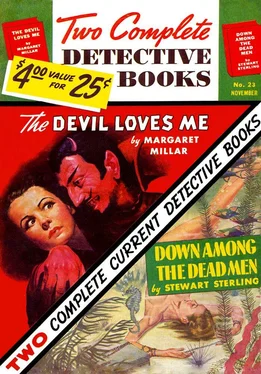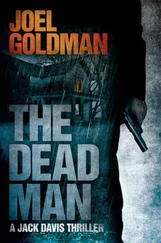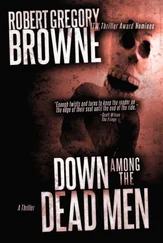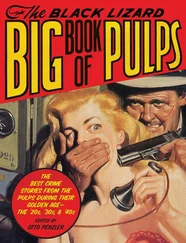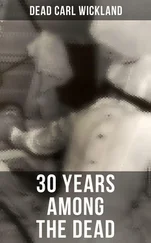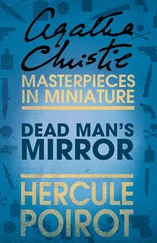Ellen was puzzled. “I don’t want to know how he managed to get on board or what name he used this time. Then I won’t have to pretend I don’t know, if the police ask me. But I should think they’d have been patrolling at the piers for him.”
“They were there in bunches. Some of the gang told me every time they turned around there’d be another stranger giving them the up and down. They had leaflets with his picture and description.”
“Why didn’t they recognize him?”
“Same reason you wouldn’t have, Ellen. You never saw a man change so much in so short a time.”
“Those days in the lifeboat?”
“Sure. No food the last five days, except one chocolate bar. Four swallows of water every twenty-four hours. Lifeboats are stocked with plenty but the sub shelled the one he was in. The Nazi idea of good, clean fun. Didn’t hit the boat, but a splinter stove in one provision locker. Salt water did the rest. Merrill lost about forty pounds. Makes a hell of a difference in his appearance. His face is so thin...”
“But even so, Tim—”
“That’s not all.” Joslin took out an old envelope, filled with newspaper clippings. He picked one out, unfolded it to its three-column width, passed it across the table. “The Mercede wasn’t one of the banana boats like most of the line. She was a tanker; they used her on the Venezuelan run; what they call a clean tanker — only carried gasoline.”
Ellen studied the clipping. There was a head line:
PRESIDENT LAUDS WINNER OF NEW MARINE MEDAL
Below was a photograph of a dark-haired youth bending over to have a sixteen-pointed star attached to his uniform. The captain said Eric Haveline was a quartermaster on the Santa Mercede , aged twenty-five, a resident of Easton, Maryland, and bashful.
“It’s tough being on one of those oil cans when they get hit,” Joslin went on. “If the torpedo doesn’t tear you apart or stun you so you don’t get on deck in time, you may get a chance to burn to death when those five million gallons start to burn and spread out over a mile of water.”
She read:
For heroism above and beyond his call of duty during enemy attack when he released and launched a life raft from a sinking and burning ship and maneuvered it through a pool of burning oil to clear water by swimming under water, coming up only to breathe—
Joslin watched the man at the second table, uneasily. “That quartermaster was burned pretty bad while he was swimming back to the ship for four others. Merrill had his hair singed to the roots.”
Ellen’s “Yes?” was barely audible.
Haveline related to the President how the submarine had surfaced close to his lifeboat. Its commander, after inquiring in excellent English, whether Captain Ovett or any of the ship’s officers had been rescued and receiving a denial, proceded to withdraw and at a half-mile distance sent several shells crashing close to the survivors’ heads before submerging.
“When Merrill’s hair grew out again, it was white.” Joslin laid sixty cents quietly under the edge of his plate, watchful of the middle-aged man. “When you add to the white hair and loss of weight the fact that he looks ten years older than he did before this last trip, you can see why the eagle-eyes didn’t recognize him.”
“Tim!” Ellen touched the clipping with a fingertip. “This says the submarine commander asked for Captain Ovett!”
“Yeah.” He avoided her gaze.
“But there isn’t any Captain Ovett.”
“No. Might have been the Nazi’s idea there was — the Mercede being an Ovett ship.”
“You don’t believe that. There was something more to it than that. You’re keeping something from me.”
“No. Honestly.” He squirmed in his chair. “That thing bothered Merrill, too. He naturally wondered if anyone on the sub really did know there was an Ovett aboard the Mercede. It was the reason he wanted to see his father so badly; he called the old man’s house from the poolroom under my place. But Lawford Ovett had just left for a meeting of the Shipowners Council with that bucko mate of his, Berger. So I guess Merrill went over to the yacht first, intending to see his father later. Then this other thing happened...” He jumped to his feet, dived for the washroom door.
Ellen heard Koski’s voice from the kitchen door: “Hold everything, hardboiled.”
The door to the washroom slammed behind Joslin. Before the union man could turn the key in the lock, Koski hurled his weight against the center panel, forced the door open. Ellen heard shoes scuffing on a tile floor, muttered oaths. Then Joslin came out with the Lieutenant behind him. The organizer’s red hair was mussed up. His leather jacket hiked up in front where Koski gripped it, in back.
“As you were.” The Harbor Squad man pushed Joslin into his chair. “I haven’t time to keep shagging after you. Squat and stay put. Unless you want to eat your next meal in cuffs.”
He drew up a third chair, sat down.
Ellen slipped the clipping into her coat pocket. “Aren’t you tired of following us around, Lieutenant?”
He tossed his hat toward a hook, ringed it. “Yair. I’m tired. Of getting the runaround from a couple of cubs who don’t seem to know from apples.”
Joslin drank some water. “We told you we didn’t know what it was all about.”
“You did. I want what you do know.” The waiter wandered in, observed Koski uneasily.
The man from the Harbor Precinct picked up the menu. “I might grab off a quickie, Bill. Crab sandwich, hot. Coffee, black. Vite!”
“Sure, boss.” The waiter shuffled away. Up front, the middle-aged man paid his check, departed.
Koski leaned back in his chair. The pain in his side hadn’t lessened. His headache had returned, with sound effects. “We had a tip young Ovett was going out on the Santa Pobrico.”
Joslin traced a pattern on the tablecloth with his fork; it looked to Koski like the silhouette of a submarine. He went on: “Coast Guard made a search at the pier just before the steamer sailed.”
Ellen folded and refolded an empty paper match container.
“Went over her from truck to keelson,” Koski moved back to let the waiter put a plate before him. “Tip was slightly cockeyed. Merrill Ovett wasn’t aboard.”
“I thought he was,” Joslin admitted. “He told me he might ship out on her.”
“Tim would have told you,” Ellen reached across the table, covered the organizer’s hand with her own, “except we were afraid—”
“—of the wrong thing, yair. You were afraid we’d catch him. You should have been afraid of the kind of guy who’d murder a man, cleave him into hunks and toss him in a tideway. Who’d shoot down a girl because she might have been a witness against him. Who’d batter a private op within an inch of his life because the dumb dope stuck his nose in the wrong place. Guy behind that sort of mayhem’s nobody to play ring-around-the-rosie with.”
“I didn’t know about those others.” Joslin stopped doodling.
The color drained out of Ellen’s face. “You haven’t anything to connect Merrill with... these crimes.”
“No? The girl came from a disorderly house three blocks from where his yacht was lying. The private investigator had trailed him over there.”
“Not like Merrill,” Joslin said, tightly. “He has a lousy temper. But he’d never shoot a woman.”
“That’s the sort of brutality you’d expect from a Nazi,” Ellen cried. “It would revolt Merrill as much as it does us.” She took out the clipping. “You can’t really believe a man who’d go through hell and high water like this,” she handed it to Koski, “would bludgeon anyone just because he was being followed.”
Читать дальше
